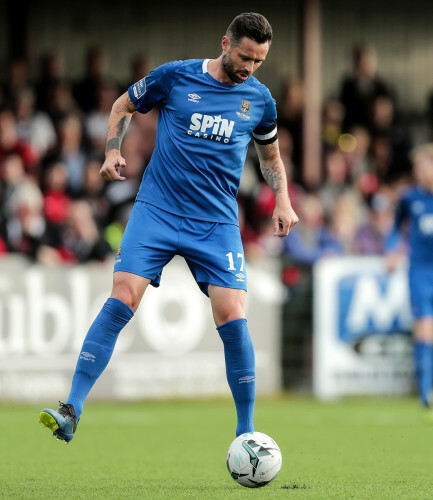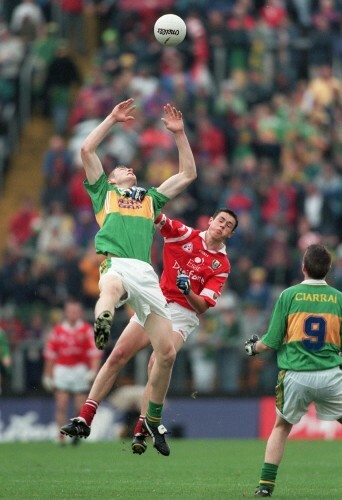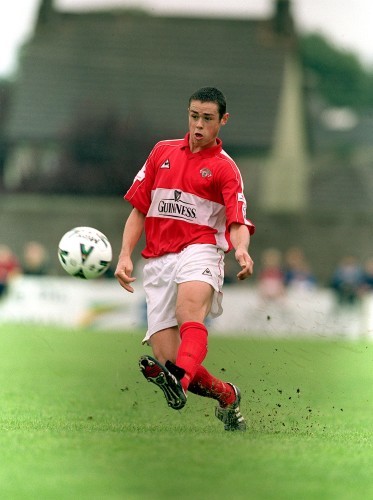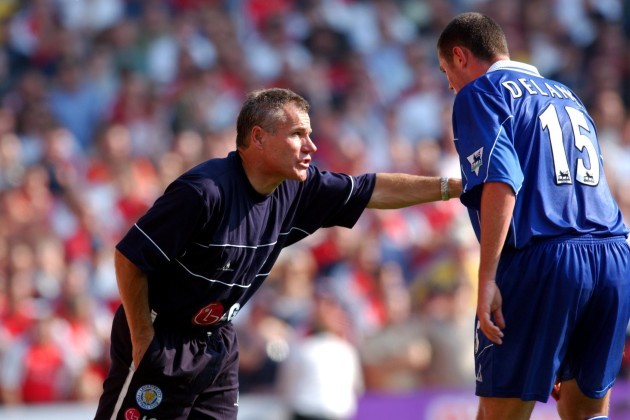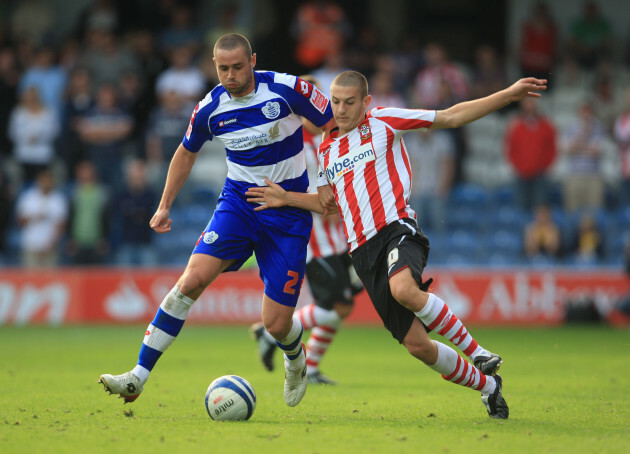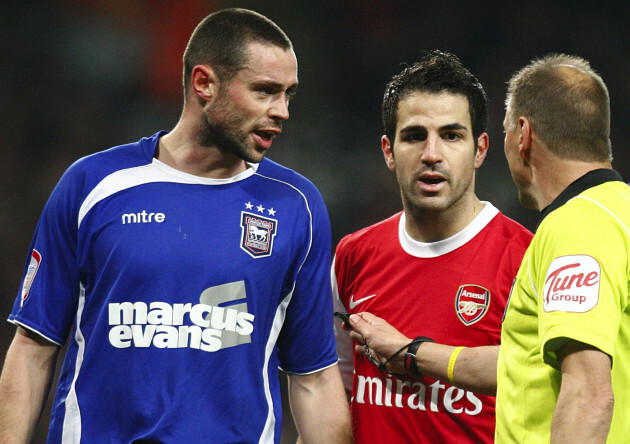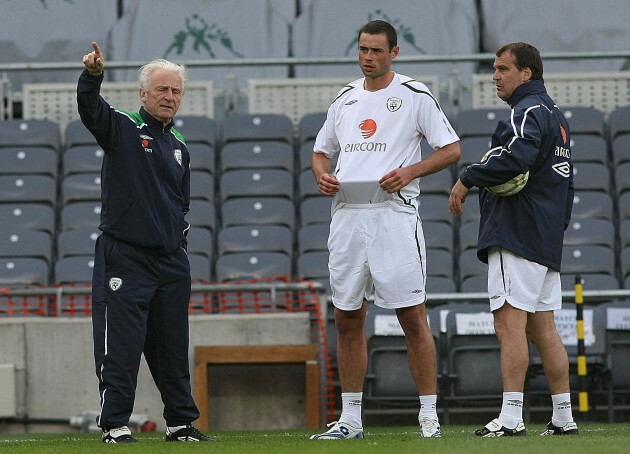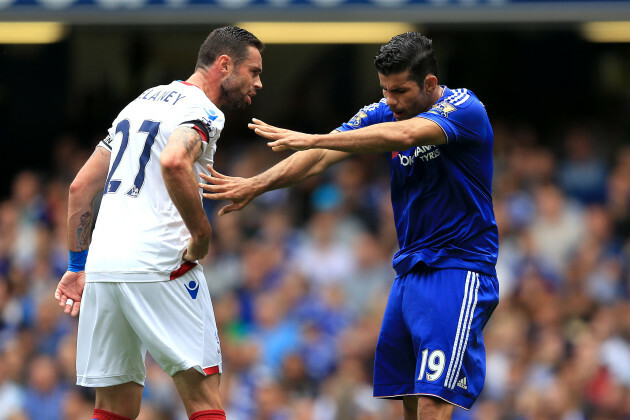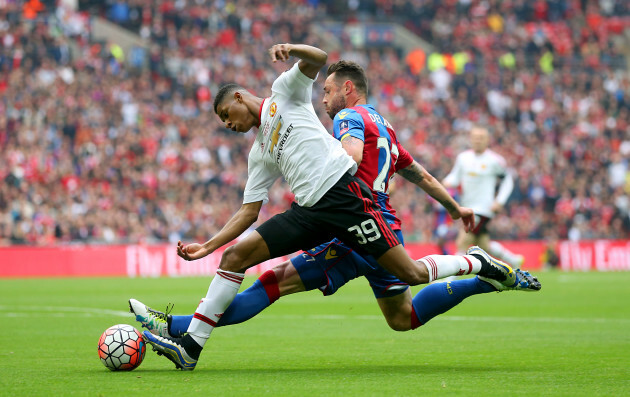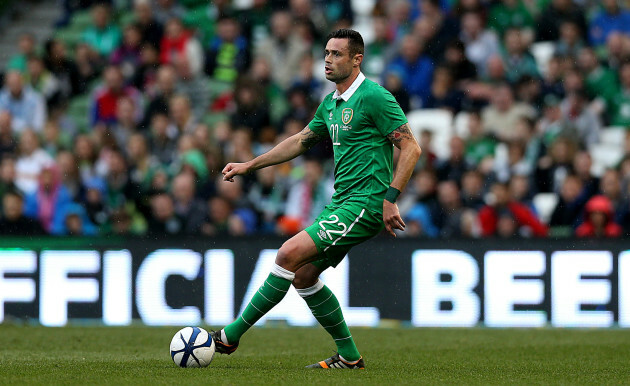WHILE NURSING A coffee shortly after coming off the golf course in Castlemartyr, Damien Delaney bears no resemblance to a man who’s likely to struggle adapting to life as a former professional footballer.
Concluding a career that spanned two decades, his recent decision to announce his retirement was straightforward. The time had come for the defender, who turned 38 last week.
As for what’s next, he’s not quite so sure. The gist of the advice imparted by his peers, including the last manager he played under at Crystal Palace, is not to rush into anything. For a man who holds a record for enduring the longest wait between Premier League appearances, remaining patient shouldn’t be a problem.
“I don’t have any plan,” the Corkman admits. “I’m definitely going to take a few months to see how I feel, and to see if I have the appetite to be back in football in some way. I wouldn’t want to come into it just to take a pay cheque. You have to go all in and let it take over your life.
“Roy Hodgson — who’s a very clever, clued-in guy — recommended to take some time and maybe try something else, and if I do come back to football after that, I’ll be a more rounded individual for it. But it’ll be a while before I know if that’s what I want to do.
“From speaking to others, I’ve found that a lot of people who miss the game or couldn’t adjust after retiring, they had regrets. There are things they wish they could have done differently. They want to go back and change that, which is largely why that feeling of missing the game, of believing that they still have something to offer, takes so long to go away. Realistically, I know I have nothing to offer as a player anymore.”
In March 2002, a 20-year-old Damien Delaney made his eighth top-flight league appearance for Leicester City against Southampton. Following a journey that lasted over 11 years, his next involvement in a Premier League fixture came on the opening day of the 2013-14 season, when he played in Crystal Palace’s meeting with Tottenham Hotspur.
The game at Selhurst Park allowed him to accomplish a goal he had given up on just 12 months earlier, when then-Palace manager Dougie Freedman convinced him to temporarily abandon his plans to quit football just weeks after his 31st birthday.
In order to establish himself at the top, Delaney had left Leicester with the intention of working his way back up from the bottom. Starting from League Two — or the Third Division, as it was then known — he eventually achieved his objective by experiencing promotion through every tier of English league football.
The year before Leicester signed Delaney from Cork City, he starred at midfield for his native county in their comprehensive Munster minor football final victory over a Kerry side featuring Tadhg Kennelly. In the subsequent All-Ireland semi-final at Croke Park, Delaney made a two-goal contribution to Cork’s loss against Mayo.
In spite of his potential as a footballer in two different codes, Delaney never encountered a conundrum over which avenue to take. While he was winning a provincial championship with Cork, as well as back-to-back Corn Uí Mhuirí medals at Coláiste Chríost Rí, his ability with a ball at his feet was beginning to garner attention from the UK.
During his first season at Leicester, Delaney was allowed to return home to Leeside for Christmas. However, owing to a glut of injuries ahead of their FA Cup third-round game against York City, he was quickly summoned back by manager Peter Taylor.
On 6 January, 2001, he came off the bench as a second-half replacement for Robbie Savage at Filbert Street in a 3-0 victory, which set up a fourth-round meeting with Aston Villa. His first start for the club came as a Leicester side that included Roberto Mancini ran out 2-1 winners at Villa Park.
“It was pretty crazy,” recalls Delaney, who was 19 at the time. “I’m in the tunnel at Villa Park getting ready to go out to play in an FA Cup game, and Roberto Mancini is standing behind me wearing the same shirt. I’m almost looking over my shoulder at him in disbelief.”
Seven weeks later, another milestone came his way. On St Patrick’s Day, he made his Premier League debut at Old Trafford, playing all 90 minutes of a 2-0 loss to a Manchester United side en route to winning their third consecutive title.
Delaney was one of three Corkonians on the field on a day when Denis Irwin was making his 500th appearance in the Premier League. Afterwards, he headed back down the M6 on the Leicester team bus with Roy Keane’s jersey stuffed into his gearbag.
“I didn’t think there was even a possibility that I’d be playing that day,” he says. “I remember being really happy because I was getting the chance to go to Old Trafford to watch a game. I assumed I was only travelling as 17th man — you had 16 in the squad in those days — so I was just excited to see Old Trafford and to watch a game there. I hadn’t been there before.
“We came in for the usual meeting before the game, the manager turned over a flip-chart and my name was there, which completely took me by surprise. Before I knew it, I was warming up, the whistle blew and I was playing at Old Trafford. It’s probably a good way to go about it. If I had been told the day before, I probably wouldn’t have slept a wink.”
As a regular occupant of the first-team dressing room at Leicester City, Delaney swiftly grew to recognise the importance of developing a thick skin. It stood to him over the course of a career during which he played under the likes of Roy Keane, Tony Pulis, Neil Warnock and Sam Allardyce.
“The dressing room was a very different place back in those days,” he explains. “For a start, there was a big, big drinking culture after games. There’d be beer on the bus on the way back from games. Players coming in hungover was acceptable.
“There were massive characters at Leicester as well. You’re talking about guys like Neil Lennon, Matt Elliott, Tim Flowers, Gerry Taggart, Muzzy Izzet, Steve Guppy… Dennis Wise too, who was a brilliant guy to learn from because he just set such high standards.
“I learned quickly to just train, keep my mouth shut and go home. The less you could be seen, the better. These guys were huge personalities with opinions on everything, and they weren’t afraid to express them.
“Compare that to now, where you have to speak to people in the right manner and managers will pull you if you lose your shit at someone. Later in my career, I’d sometimes forget that the young players now were raised in a different environment. When I was coming up, you’d have the shit kicked out of you — seriously — if you opened your mouth out of turn. But times change and you have to change with them.”
By the end of his second season at Leicester, Delaney had only played 11 competitive games. Having just turned 21, time was still on his side, yet he wasn’t content to sit and wait. Loan spells at Stockport County, Huddersfield Town and Mansfield Town convinced him that taking a step or two backwards might provide him with a more suitable route forward. Late in 2002, Peter Taylor made Delaney his first signing after he took over at Division Three club Hull City.
“I hated playing reserve team football,” he says. “I just thought it was pointless playing in empty stadiums on a Monday night. I still had a couple of years on my contract at Leicester but I went at the first opportunity. I just wanted to play football. I’d much rather play in League Two or the Conference than sit on the bench in the Premier League.
“The only way you’re going to improve is by playing every week in an environment where if you make a mistake, it costs your team three points and it ruins your weekend. I knew I wasn’t going to become a regular at Leicester at that stage. I didn’t care where I went as long as I was going to play. As soon as the chance came, I was gone.”
During a spell that lasted five-and-a-half years, Delaney — who won Hull’s Player of the Season award for 2003-04 — helped the club to achieve back-to-back promotions, which brought them from the bottom tier of the Football League to within touching distance of the Premier League in the space of two seasons.
After making nearly 250 appearances, he left for fellow Championship club Queens Park Rangers in January 2008. Hull went on to be promoted to the top flight at the end of that season, but the offer from QPR was “just far too good to refuse,” Delaney explains.
“I felt at that stage that it was time for a new challenge anyway, because I had been at Hull for nearly six years. I went down to QPR then and it turned out to be an an interesting spell, to say the least.”
With controversial chairman Flavio Briatore holding the reins, Delaney was at QPR during a rather turbulent time for the club. In 18 months at Loftus Road, he played under three permanent managers — Luigi De Canio, Iain Dowie and Paulo Sousa — as well as caretaker boss Gareth Ainsworth, who had a couple of interim stints at the helm.
Delaney says: “Things were a shambles at the club. You’d barely have said ‘hello’ to a new manager by the time he was sacked again. It was a bit toxic so I couldn’t wait to get out in the end.
“Paulo Sousa — who I thought very highly of as both a person and a manager — called me into his office one day and said I wasn’t going to be playing the following day. When I asked him why, he told me the owner wanted to help pick the team. ‘I have to give him two or three and unfortunately you’re one of them,’ he said. That kind of stuff was going on all the time. It was crazy.”
In the summer of 2009, just over eight years after they exchanged jerseys as opponents at Old Trafford, Delaney became Roy Keane’s first signing at Ipswich Town.
“After I met Roy it was a no-brainer for me,” he says. “When Roy Keane phones you, you meet him and he wants to sign you, you’re not going to go anywhere else.”
Nevertheless, the relationship between them soon became strained. At one point, the club was forced to release a statement to “categorically refute” claims that the pair had come to blows on the training ground. In his 2014 autobiography, Keane admitted that he “went over the top” in his treatment of Delaney during his time as Ipswich manager.
“I have no ill-feeling towards Roy whatsoever,” Delaney insists. “He is who he is and he managed in the way that he thought was right, which was fine. It just didn’t work out. Let bygones be bygones.
“What I would say is that he picked me every week, which is the ultimate compliment from a manager. I couldn’t give a fuck if a manager doesn’t talk to me from one end of the week to the next as long as I’m playing, which is more than can be said for nearly everyone else who was at the club.
“A lot of players need an arm around them and to be told how great they are. They need managers on their side. I was never like that. When the teamsheet goes in at 2pm on a Saturday, if my name is on it, that’s the most important thing. That means he believes he can win a game of football with me in his team. That’s all I cared about.
“If the only time a manager talks to me is to give me a bollocking on the training ground on a Tuesday, that’s no problem with me once I’m in his team on the Saturday. I just got on with it.”
A few months after Keane was replaced by Paul Jewell, Delaney underwent surgery for compartment syndrome which was caused by a training-ground collision with Grant Leadbitter. What he initially thought was a dead leg transpired to be an issue that could have ended his career without the appropriate course of action.
He recalls: “I was in so much pain I was vomiting into a bin. The morphine they gave me at the hospital was badly needed. It was basically like a dead leg that just kept swelling. It went all up my leg and my hip. Because the oxygen supply was cut off, I had a limited number of minutes before the muscle would be completely dead.
“They opened me up from hip to knee to release it, but it was still pretty bad so they couldn’t stitch me up. I had an open wound for three days. The surgeon did really well to staple it and thankfully it shut. That was a dicey enough time.”
Having worked so hard to save his career with months of recovery and rehabilitation, Delaney reached a point in August 2012 where he was ready to walk away from the game. With his passion dwindling, his contract at Ipswich was terminated by mutual agreement and he was making peace with the idea of not playing professionally beyond the age of 30.
“I just felt like I’d had enough, to the extent where I was wondering what the point was in going in every day. I wasn’t enjoying it, and if you’re not enjoying something then why keep doing it?
“If I’m working every day, there needs to be a goal to chase down. But it started to feel like we weren’t going anywhere so I was starting to lose interest. ‘Are we really having a go here or are we messing about?’ — that was how I felt.
“In my head I was finished [with football]. A couple of people had been in touch about going out to America to play the following January, but I really wasn’t too bothered either way. I was actually on my way home to Cork, which was when Dougie Freedman got in touch.”
Under Freedman’s stewardship, Crystal Palace had started the 2012-13 Championship season inauspiciously. They failed to pick up a single point from the three games they played prior to Delaney’s arrival. Thereafter, they embarked on a 14-match unbeaten run that catapulted from the bottom of the table to the very top.
“Dougie persisted with me and eventually he convinced me to come in on an initial three-month deal,” Delaney explains. “I remember talking to my dad about it and he said, ‘you might as well go there and get paid for three months instead of coming home and doing nothing’.
“So I did, and I’m very, very glad that I did. Suddenly we were top of the table, and at that stage I didn’t want to leave. As soon as I walked into that dressing room I knew they were a good group. It was a very different vibe. We weren’t a great team, but what mattered was that there was a willingness to become a great team. That’s what gets the juices flowing. It was an eclectic mix of random signings and stray cats, but it worked.”
Backboned by the likes of Delaney, Yannick Bolasie, Wilfried Zaha and Glenn Murray, Palace secured promotion back to the Premier League for the first time in eight years thanks to a 1-0 win against Watford after extra-time in the play-off final at Wembley.
As the Palace players began their celebrations on the pitch, Delaney was initially conspicuous by his absence. He was eventually located by team-mate Peter Ramage in the tunnel, in tears, overwhelmed by the significance of the accomplishment.
“From pretty much throwing the towel in, to achieving everything I ever wanted in the space of about seven or eight months, that season was just a crazy ride,” he says.
“Hull and QPR were both promoted [to the Premier League] not long after I left them. You start to think then that the dream has died. It’s a really good feeling to achieve something like that when you know you’ve worked so hard for it.”
Delaney accumulated a plethora of career highlights with Palace while appearing 130 times in England’s top flight. He played his part in wins against Chelsea, Arsenal, Manchester City, Tottenham Hotspur and Liverpool, against whom he scored his first Premier League goal in a famous 3-3 draw that was detrimental to the opposition’s title challenge.
Ask Crystal Palace fans about his finest hour and the likelihood is that they’ll recount a trip to Stamford Bridge to face the defending Premier League champions in 2015. Delaney, wearing the captain’s armband, nullified the threat of Diego Costa to help Palace to a 2-1 win that saw Jose Mourinho suffer just his second defeat in 100 home league games in charge of Chelsea.
“That was a big one,” Delaney recalls fondly. “For me, one of the most difficult things to do in football is to win away to one of the top four in England. Doing that was pretty high up on the list of goals I had set. For a team like Crystal Palace to do that was huge.”
As for his effective policing of the aforementioned Spanish international, Delaney says: “Listen, everyone that day was phenomenal. I did a good job on Costa but I remember I lost Falcao for their goal — he got across me for an unbelievable diving header. Thankfully Wardy [Joel Ward] went straight up and scored the winner so I only had about two minutes of feeling sorry for myself!”
That season concluded for Delaney with another Wembley showpiece as Palace reached the FA Cup final. A 2-1 defeat to Manchester United — which was sealed by Jesse Lingard’s extra-time strike — hasn’t prevented him from valuing his involvement in the occasion.
“I got to play in a game of football that I used to pretend to play in when I was a kid on my estate,” he says. “I remember watching it with my dad when I was growing up. Maybe now the FA Cup has lost its attraction, but I remember when it was huge, when it was the main date on the football calendar. For me to experience it, the build-up and the game itself, was something special.
“My family travelled over, the football world is watching and you’re there in the middle of it. The result didn’t go our way, which is fine. I dealt with that a long time ago. But the experience of partaking in a game like that is something I’ll take with me for a long time.”
At that stage, Delaney’s status as an established Premier League defender was at odds with his limited involvement at international level. He won just nine senior caps for Ireland, eight of which were awarded by Giovanni Trapattoni. His first — and last — appearance under Martin O’Neill came in an end-of-season friendly with Turkey in 2014.
Six days later, he was left on the bench for a game against Italy — also a friendly. An Ireland squad then flew to the USA for two further inconsequential fixtures against Costa Rica and Portugal. Having played 40 competitive games for his club during the 2013-14 campaign, Delaney — who was about to turn 33 — asked to be excused from the Transatlantic trip to allow for sufficient recuperation from a long season.
He felt the request was reasonable, but the Ireland manager seemed to interpret the situation differently. O’Neill would claim that the Crystal Palace player only wished to be considered in future if his place in the team was guaranteed. Delaney, who later refuted that in a statement released on Instagram, never featured in another Ireland squad.
Three weeks after playing in the FA Cup final, he watched from his hotel room bed while on holiday in Los Angeles as Ireland began their journey at the European Championships with a 1-1 draw against Sweden.
“Of course I’d love to have been there,” he says. “I remember lying there in the bed, just going, ‘fucking hell!’ But it is what it is. I didn’t get picked. After the FA Cup final, one of the reporters asked me about it. I said I didn’t think I would be picked, but if they needed me then of course I’d be there. But obviously they felt like they didn’t.”
He adds: “When he [Martin O'Neill] came out and said I demanded to play, I mean, fucking hell… when I read that I started questioning myself and what I had actually said. But I never said anything of the sort. It was unbelievable.
“People might say I could have won a lot more caps with Ireland, but on the other side, if I did, would I have played into my mid-to-late 30s at club level? I got to experience some great things with Crystal Palace when it would have been hard to combine the two at my age. I wasn’t young enough to do that anymore.”
When Delaney parted company with Palace last summer, he returned to his hometown club to aid their defences of the Premier Division title and the FAI Cup. However, Cork City ultimately relinquished both pieces of silverware to Dundalk, with their veteran defender left to rue a defeat to Bohemians along the way. A couple of costly errors at Dalymount Park served as a harsh reminder that he was no longer at the peak of his powers.
Delaney moved on to Waterford for the 2019 season, before deciding — despite not missing a minute of league action for the club — to call time on his career earlier this month. He did so in the knowledge that he gave of himself to the game while he had the opportunity to do so, which allowed him to experience his best days on the far side of 30.
“Anyone who played with me will tell you I achieved more than I ever should have,” he says. “And they’d mean that in a nice way, if that makes sense. But it’s true. It was through hard work and sheer will. I’m not particularly talented but I was willing to persevere. That’s what made the difference and brought me where I got to.
“When I was growing up, I was never considered a particularly special player, even around where I lived. I was okay, don’t get me wrong, but I didn’t go on trial in the UK until I was 17 or 18, whereas most kids were going over at 14. It was just pure perseverance all the way.
“I fully believe that if you’re working hard enough — no matter what it is — you’ll eventually get to where you want to be.”
The42 is on Instagram! Tap the button below on your phone to follow us!
